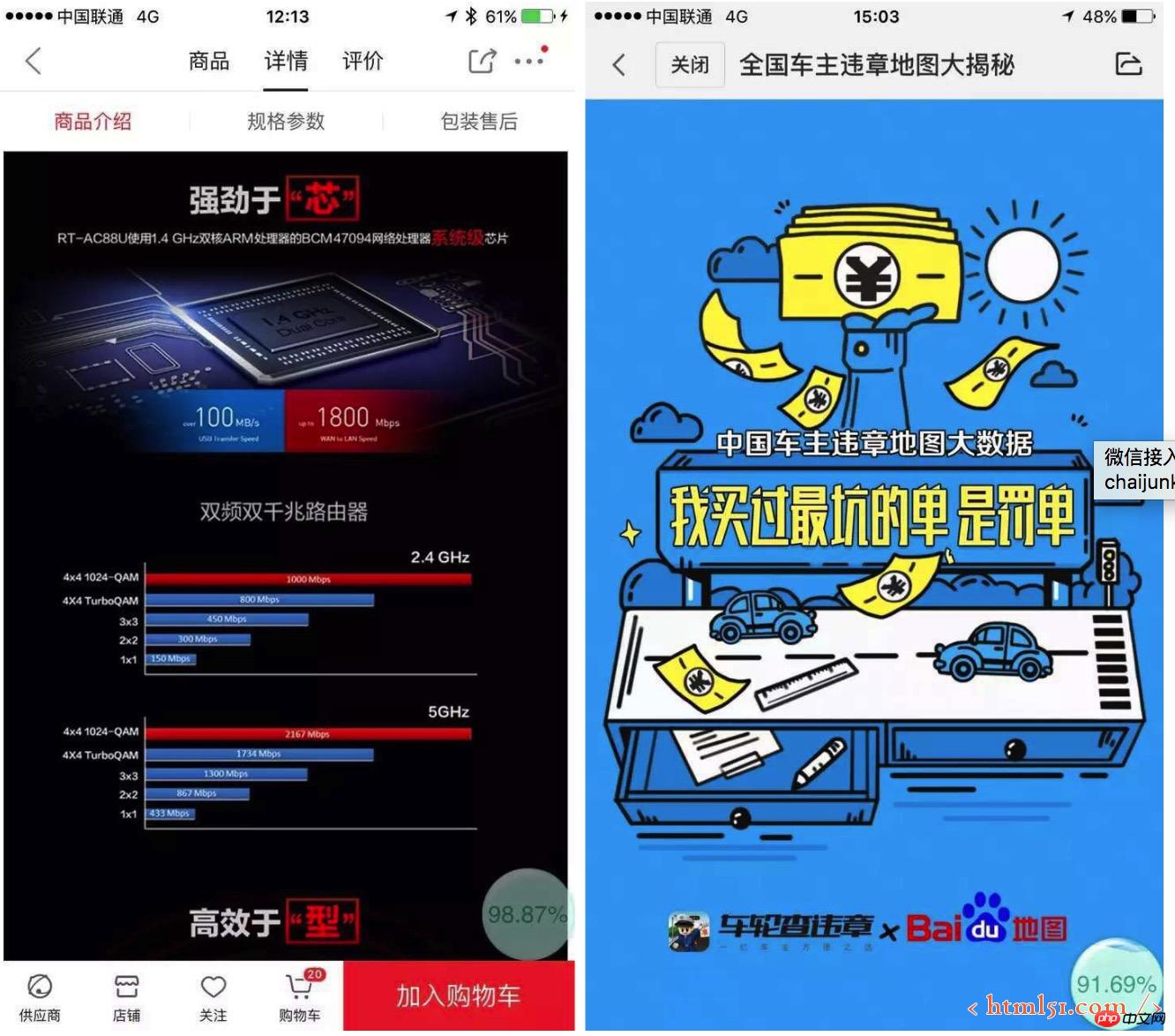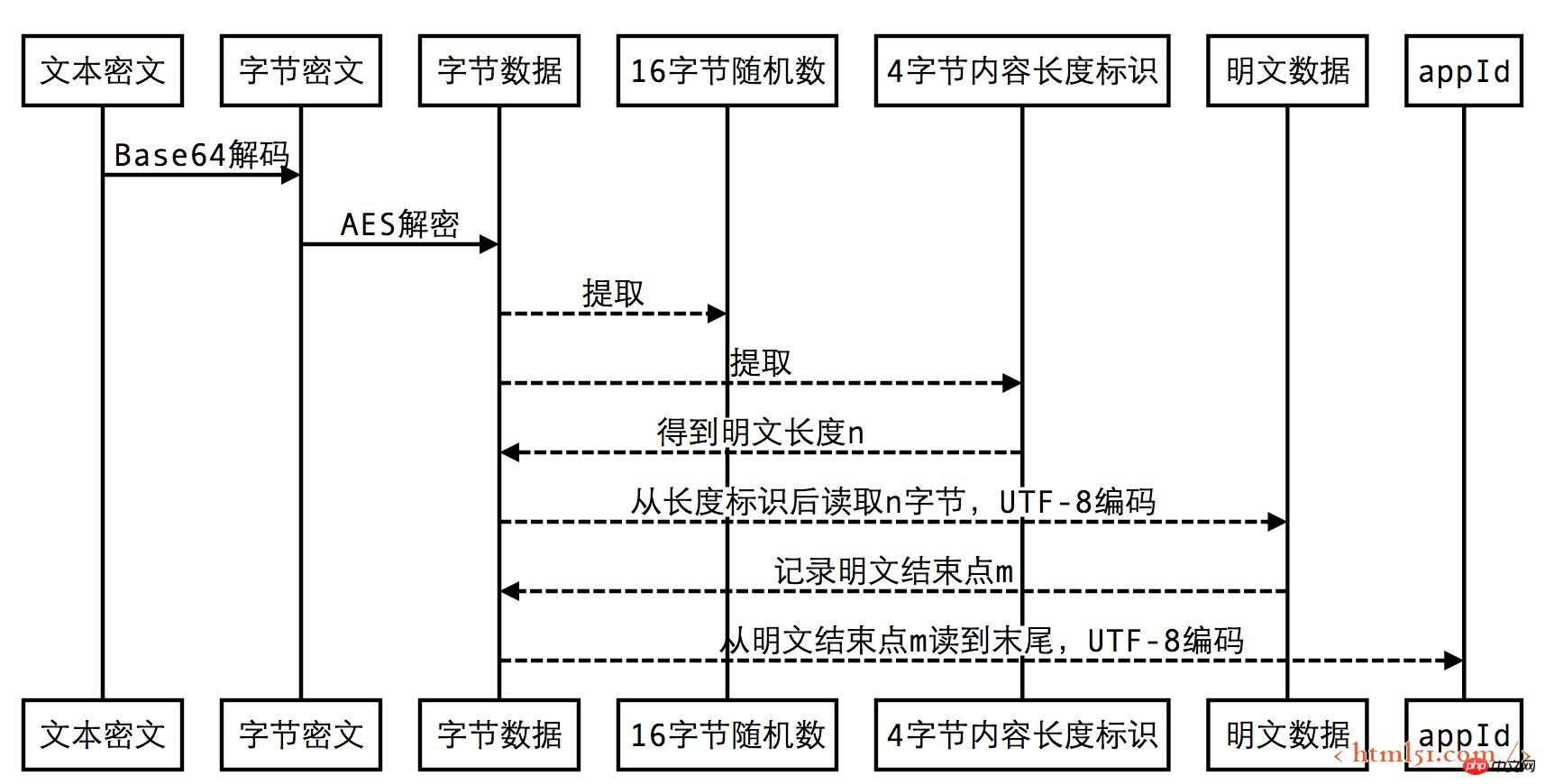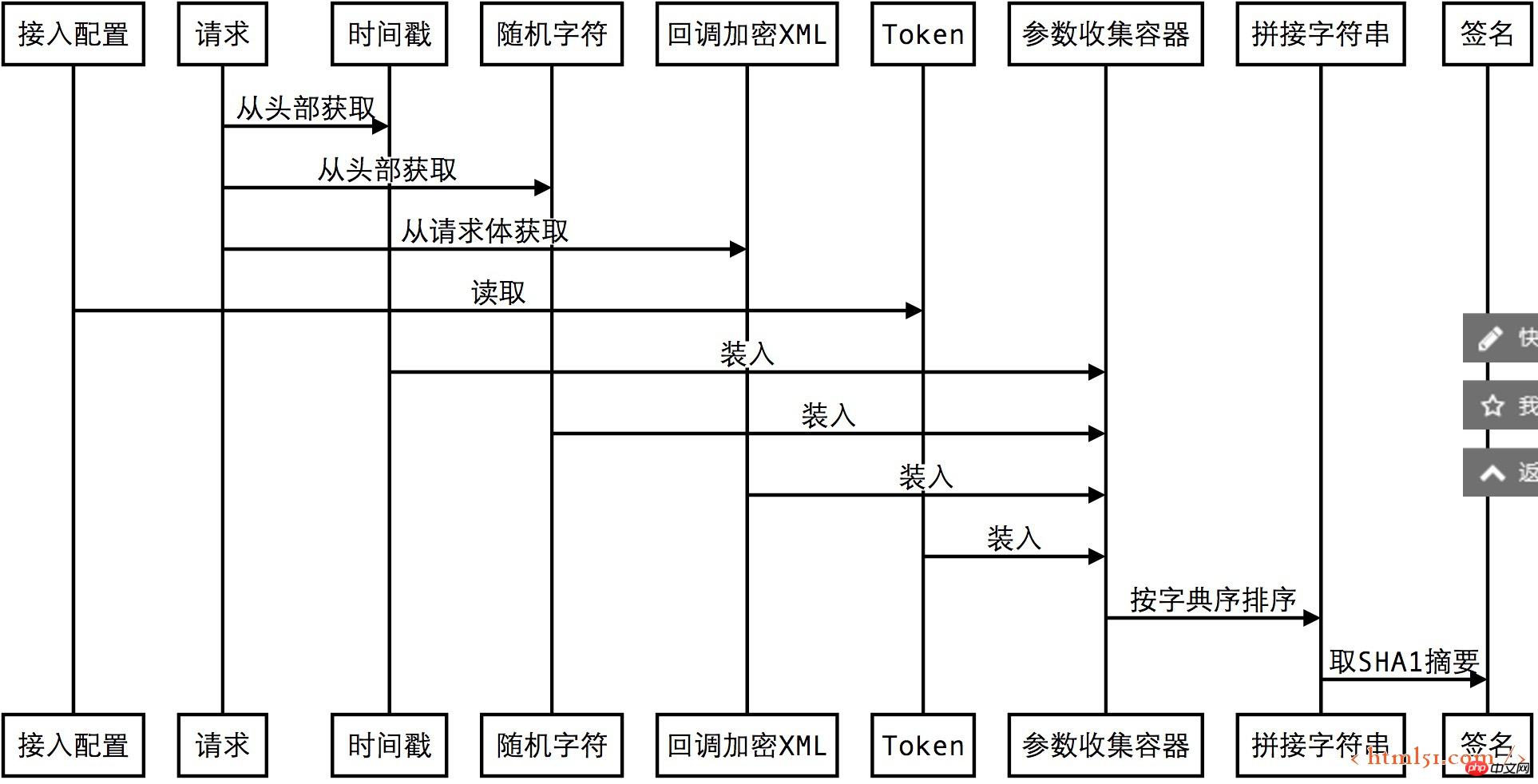 WeChat Applet
WeChat Applet
 Mini Program Development
Mini Program Development
 Exploring WeChat Access—Processing of Encrypted Messages
Exploring WeChat Access—Processing of Encrypted Messages
Exploring WeChat Access—Processing of Encrypted Messages
In the previous blog post, we introduced the abstract data level of the passive callback interface and implemented an efficient basic function for converting entities to XML. Careful developers will find an option called "Message Encryption and Decryption Method" when modifying the basic configuration of the official account for the first time. The values available for selection after expansion are: "Clear text mode" (default), "Compatibility mode" and "Safe mode (recommended)". So what is this safe mode? How to adapt to safe mode? With these questions in mind, let’s enter the third exploration journey of WeChat access.
Abominable traffic hijacking At the beginning of the article, let me show you two screenshots of mobile phones in normal use:

On the right side of the screen You will see a green water balloon in the lower corner, which is incompatible with the picture to be displayed, and is obviously not done by the designer. Click on the water balloon to display the remaining traffic details in the current communication package.
From the home LAN to the Internet to the IDC computer room intranet, our data links are full of forwarding processes. Our data may be persisted and saved when it is forwarded by any device. Is your office intranet secure? Hackers lurking around you can receive a copy of all data in the LAN by setting a certain network card in the LAN to Promiscuous Mode. Maybe you can't find anything, but your private data has been stolen by others.
Use safe mode to protect user privacy
When safe mode is enabled, the messages received by the passive callback interface change greatly, and the form is as follows:
<xml>
<ToUserName><![CDATA[gh_38a2de904e09]]></ToUserName>
<Encrypt><![CDATA[i7b8ccNA9OWDhau/F26aUWKFJ6Jd0imsDQIFPSdSfAg8mHT7rL0kIWSVpcqf6/dVSoOQOQK4T/CS3w96j4k3qcg89M6xn2RGZBs+9JkrsdRig5yhcia1B59akWb1t9QdutXqnl4edAqtXEh8SIs+N2HkOTTVldtOUHpdwLqRYuC4F6ejUoXui4xKuc3oyODR9edfL+xzZ7JfMJ1KUNF/YBJMj/Ba9y/CLLYmdFYOtCMH7tMUz8h+S0XKkHKN6r0ELLCIZJ9+PPlHZcfSGhwMLUeRF1nMIjXGEKHkI0uMcruh7wD96lMU/RFgJDjAk26xbmUYfa3l+34p+txw4R8iD3Q58S8Yekiy3lUsbk+C6eDeefGs1ck23BQ8xWU3AReWH2dEsY6SYIkb3ANeyJmcoIKZfpc/31njp0KcHAxL1Lk=]]></Encrypt>
</xml>It can be seen that the plain text part retains the original ID of the official account of the message: gh_38a2de904e09, and the rest is encrypted text (this structure allows the same backend system to access multiple official accounts, and then use the ID of each official account settings for separate decryption). Since the encryption structure is not clearly explained in the official document (http://qydev.weixin.qq.com/wiki/index.php?title=Encryption and Decryption Library Download and Return Code), I will give you a detailed explanation here. .

#If the reader has developed network protocols before, it should be easy to understand this structure, a typical variable length message. There must be a mark to indicate the length of the variable-length area. This value shall prevail when reading, and a number of bytes will be read after the fixed-length data. At the beginning of the structure, there is a 16-byte random number. This part of the data has no practical meaning and can be used as random number padding data when returning encrypted messages later.
Safe mode signature verification method
WeChat’s passive callback interface is actually an HTTP POST request. We all know that HTTP requests are divided into request headers and request bodies. WeChat cleverly puts the encrypted XML data in the request body and puts the parameters used when verifying the signature into the request header.
POST /cgi-bin/wxpush? msg_signature=477715d11cdb4164915debcba66cb864d751f3e6×tamp=1409659813&nonce=1372623149 HTTP/1.1
Host: qy.weixin.qq.com
Content-Length: 613
<xml>
<ToUserName><![CDATA[wx5823bf96d3bd56c7]]></ToUserName>
<Encrypt><![CDATA[RypEvHKD8QQKFhvQ6QleEB4J58tiPdvo+rtK1I9qca6aM/wvqnLSV5zEPeusUiX5L5X/0lWfrf0QADHHhGd3QczcdCUpj911L3vg3W/sYYvuJTs3TUUkSUXxaccAS0qhxchrRYt66wiSpGLYL42aM6A8dTT+6k4aSknmPj48kzJs8qLjvd4Xgpue06DOdnLxAUHzM6+kDZ+HMZfJYuR+LtwGc2hgf5gsijff0ekUNXZiqATP7PF5mZxZ3Izoun1s4zG4LUMnvw2r+KqCKIw+3IQH03v+BCA9nMELNqbSf6tiWSrXJB3LAVGUcallcrw8V2t9EL4EhzJWrQUax5wLVMNS0+rUPA3k22Ncx4XXZS9o0MBH27Bo6BpNelZpS+/uh9KsNlY6bHCmJU9p8g7m3fVKn28H3KDYA5Pl/T8Z1ptDAVe0lXdQ2YoyyH2uyPIGHBZZIs2pDBS8R07+qN+E7Q==]]></Encrypt>
</xml>The process of signature generation:

#Through the above calculation, the signature calculated_sign of the current encrypted message is now obtained, and then the parameter msg_signature is obtained from the request header , if calculated_sign and msg_signature are the same, it means that the message has not been tampered with. The mathematical problems utilized by this signature strategy are:
1. The SHA1 digest algorithm calculates all data, and any changes to the final digest will change;
2. The Token is set in advance, and during the transmission process is not included in and cannot be cracked;
3. The introduction of timestamps and random characters makes the ciphertext different every time even if the plaintext is the same, making it more difficult to crack AES encryption
Signature verification successful You can then safely use the decrypted plaintext. The format of the plaintext is consistent with the format introduced in the previous article, so the decrypted business processing logic can be reused.
As a response to safe mode, the returned XML format should also be encrypted. The entire encryption process is in the opposite direction to the decryption process, so I won’t go into details here.
For more WeChat access exploration—encrypted message processing related articles, please pay attention to the PHP Chinese website!

Hot AI Tools

Undresser.AI Undress
AI-powered app for creating realistic nude photos

AI Clothes Remover
Online AI tool for removing clothes from photos.

Undress AI Tool
Undress images for free

Clothoff.io
AI clothes remover

Video Face Swap
Swap faces in any video effortlessly with our completely free AI face swap tool!

Hot Article

Hot Tools

Notepad++7.3.1
Easy-to-use and free code editor

SublimeText3 Chinese version
Chinese version, very easy to use

Zend Studio 13.0.1
Powerful PHP integrated development environment

Dreamweaver CS6
Visual web development tools

SublimeText3 Mac version
God-level code editing software (SublimeText3)

Hot Topics
 1387
1387
 52
52
 Xianyu WeChat mini program officially launched
Feb 10, 2024 pm 10:39 PM
Xianyu WeChat mini program officially launched
Feb 10, 2024 pm 10:39 PM
Xianyu's official WeChat mini program has quietly been launched. In the mini program, you can post private messages to communicate with buyers/sellers, view personal information and orders, search for items, etc. If you are curious about what the Xianyu WeChat mini program is called, take a look now. What is the name of the Xianyu WeChat applet? Answer: Xianyu, idle transactions, second-hand sales, valuations and recycling. 1. In the mini program, you can post idle messages, communicate with buyers/sellers via private messages, view personal information and orders, search for specified items, etc.; 2. On the mini program page, there are homepage, nearby, post idle, messages, and mine. 5 functions; 3. If you want to use it, you must activate WeChat payment before you can purchase it;
 WeChat applet implements image upload function
Nov 21, 2023 am 09:08 AM
WeChat applet implements image upload function
Nov 21, 2023 am 09:08 AM
WeChat applet implements picture upload function With the development of mobile Internet, WeChat applet has become an indispensable part of people's lives. WeChat mini programs not only provide a wealth of application scenarios, but also support developer-defined functions, including image upload functions. This article will introduce how to implement the image upload function in the WeChat applet and provide specific code examples. 1. Preparatory work Before starting to write code, we need to download and install the WeChat developer tools and register as a WeChat developer. At the same time, you also need to understand WeChat
 Implement the drop-down menu effect in WeChat applet
Nov 21, 2023 pm 03:03 PM
Implement the drop-down menu effect in WeChat applet
Nov 21, 2023 pm 03:03 PM
To implement the drop-down menu effect in WeChat Mini Programs, specific code examples are required. With the popularity of mobile Internet, WeChat Mini Programs have become an important part of Internet development, and more and more people have begun to pay attention to and use WeChat Mini Programs. The development of WeChat mini programs is simpler and faster than traditional APP development, but it also requires mastering certain development skills. In the development of WeChat mini programs, drop-down menus are a common UI component, achieving a better user experience. This article will introduce in detail how to implement the drop-down menu effect in the WeChat applet and provide practical
 Implement image filter effects in WeChat mini programs
Nov 21, 2023 pm 06:22 PM
Implement image filter effects in WeChat mini programs
Nov 21, 2023 pm 06:22 PM
Implementing picture filter effects in WeChat mini programs With the popularity of social media applications, people are increasingly fond of applying filter effects to photos to enhance the artistic effect and attractiveness of the photos. Picture filter effects can also be implemented in WeChat mini programs, providing users with more interesting and creative photo editing functions. This article will introduce how to implement image filter effects in WeChat mini programs and provide specific code examples. First, we need to use the canvas component in the WeChat applet to load and edit images. The canvas component can be used on the page
 Use WeChat applet to achieve carousel switching effect
Nov 21, 2023 pm 05:59 PM
Use WeChat applet to achieve carousel switching effect
Nov 21, 2023 pm 05:59 PM
Use the WeChat applet to achieve the carousel switching effect. The WeChat applet is a lightweight application that is simple and efficient to develop and use. In WeChat mini programs, it is a common requirement to achieve carousel switching effects. This article will introduce how to use the WeChat applet to achieve the carousel switching effect, and give specific code examples. First, add a carousel component to the page file of the WeChat applet. For example, you can use the <swiper> tag to achieve the switching effect of the carousel. In this component, you can pass b
 What is the name of Xianyu WeChat applet?
Feb 27, 2024 pm 01:11 PM
What is the name of Xianyu WeChat applet?
Feb 27, 2024 pm 01:11 PM
The official WeChat mini program of Xianyu has been quietly launched. It provides users with a convenient platform that allows you to easily publish and trade idle items. In the mini program, you can communicate with buyers or sellers via private messages, view personal information and orders, and search for the items you want. So what exactly is Xianyu called in the WeChat mini program? This tutorial guide will introduce it to you in detail. Users who want to know, please follow this article and continue reading! What is the name of the Xianyu WeChat applet? Answer: Xianyu, idle transactions, second-hand sales, valuations and recycling. 1. In the mini program, you can post idle messages, communicate with buyers/sellers via private messages, view personal information and orders, search for specified items, etc.; 2. On the mini program page, there are homepage, nearby, post idle, messages, and mine. 5 functions; 3.
 Implement the sliding delete function in WeChat mini program
Nov 21, 2023 pm 06:22 PM
Implement the sliding delete function in WeChat mini program
Nov 21, 2023 pm 06:22 PM
Implementing the sliding delete function in WeChat mini programs requires specific code examples. With the popularity of WeChat mini programs, developers often encounter problems in implementing some common functions during the development process. Among them, the sliding delete function is a common and commonly used functional requirement. This article will introduce in detail how to implement the sliding delete function in the WeChat applet and give specific code examples. 1. Requirements analysis In the WeChat mini program, the implementation of the sliding deletion function involves the following points: List display: To display a list that can be slid and deleted, each list item needs to include
 Implement image rotation effect in WeChat applet
Nov 21, 2023 am 08:26 AM
Implement image rotation effect in WeChat applet
Nov 21, 2023 am 08:26 AM
To implement the picture rotation effect in WeChat Mini Program, specific code examples are required. WeChat Mini Program is a lightweight application that provides users with rich functions and a good user experience. In mini programs, developers can use various components and APIs to achieve various effects. Among them, the picture rotation effect is a common animation effect that can add interest and visual effects to the mini program. To achieve image rotation effects in WeChat mini programs, you need to use the animation API provided by the mini program. The following is a specific code example that shows how to



